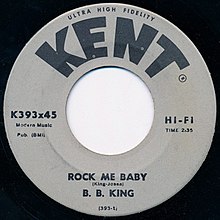| "Rock Me Baby" |
|---|
 |
| Single by B.B. King |
|---|
| from the album Rock Me Baby |
|---|
| B-side | "I Can't Lose" |
|---|
| Released | May 1964 |
|---|
| Format | 7-inch 45 rpm record |
|---|
| Recorded | Los Angeles, California prior to January 14, 1962 |
|---|
| Genre | Blues |
|---|
| Length | 2:56 |
|---|
| Label | Kent (no. 393) |
|---|
| B.B. King singles chronology |
|---|
"How Blue Can You Get"
(1964) | "Rock Me Baby"
(1964) | "Help The Poor"
(1964) |
|
"Rock Me Baby" is a blues standard that has become one of the most recorded blues songs of all time.[2] When B.B. King's recording of "Rock Me Baby" was released in 1964, it became his first Top 40 hit. It is based on earlier blues songs and has been interpreted and recorded by numerous artists in a variety of styles.
Earlier songs
B.B. King's "Rock Me Baby" is based on "Rockin' and Rollin'", a song recorded by Lil' Son Jackson in 1950 (Imperial 5113). King's lyrics are nearly identical to Jackson's, although instrumentally the songs are different. "Rockin' and Rollin'" is a solo piece, with Jackson's vocal and guitar accompaniment, whereas "Rock Me Baby" is an ensemble piece.
Muddy Waters' song "Rock Me", recorded in 1956 (Chess 1652), is also based on Jackson's song. Some of Jackson's lyrics were used, but Waters incorporated a couple of verses from his 1951 song "All Night Long" (which is also based on "Rockin' and Rollin'") (Chess 1509). Muddy Waters' "Rock Me" also uses Jackson's guitar figure and the starting of the vocal on the IV chord and he interpreted it as an unusual fifteen-bar blues (an uneven number of measures, rather than the traditional twelve bars or somewhat less common eight or sixteen bars). Muddy Waters recorded a second version of "Rock Me" for his 1978 album I'm Ready.
Lil' Son Jackson's "Rockin' and Rollin'" was inspired by earlier blues songs Many songs from the 1920s through the 1940s have some combination of rock, roll, baby, and mama in the title or lyrics, although instrumentally they are different than "Rock Me Baby", "Rock Me", or "Rockin' and Rollin'". Big Bill Broonzy's 1940 song "Rockin' Chair Blues" makes frequent use of the phrase "rock me baby" as in "Rock me baby now, rock me slow ... now rock me baby, one time before you go" (OKeh 6116). Arthur Crudup's 1944 song, "Rock Me Mama", is based on Broonzy's song and repeats the same refrain, but uses "mama" in place of "baby" (Bluebird 34-0725). Curtis Jones' 1939 song "Roll Me Mama" shares a couple of phrases ("like a wagon wheel", "ain't got no bone") with "Rockin' and Rollin'" (Vocalion 4693).
B.B. King song
"Rock Me Baby" is a medium-tempo twelve-bar blues notated in the key of C in common or 4/4 time.[In addition to King's vocal and guitar, the song features a "tight, punchy arrangement underpinned by a pianist whose identity is in some doubt". Kent part-owner Joe Bihari recalled the pianist as King's frequent collaborator Maxwell Davis, although others have been suggested, such as Lloyd Glenn and Jimmy McCracklin.The arrangement "provides a blues structure that allows King room for biting guitar work" and appealed to many guitarists.
There is some confusion as to when B.B. King recorded "Rock Me Baby". Although King had signed to ABC-Paramount Records in January 14, 1962, his former label, Kent Records, continued to release singles (and albums) well into the 1970s from "many unreleased King masters ... thus forcing King to compete with himself". Recording dates have been estimated as "about 1958"[ to before 1962.[1] The song was released shortly after King's Paramount release "How Blue Can You Get" in 1964 and reached number 34 in the Billboard Hot 100.[6][7] "Rock Me Baby" was the first of six B.B. King records to reach the pop Top 40. In 1997, King re-recorded the song with Eric Clapton for the album Deuces Wild.
Recordings by other artists
Over the years, many blues and other artists have interpreted and recorded "Rock Me Baby". Although "most contemporary versions are based on Lil' Son Jackson's 1951 record, 'Rockin' and Rollin'", "B.B. King and Muddy Waters can share credit for making it one of the most familiar blues songs of all time."
Some studio versions include Otis Redding from Otis Blue: Otis Redding Sings Soul (1965), the Animals from Animalism (1966), Jeff Beck as "Rock My Plimsoul" from the Truth album with slightly altered lyrics (1968), Slim Harpo in his Tip On In album (1968, also with altered lyrics), Blue Cheer from Vincebus Eruptum (1968), Lightnin' Hopkins from Lightnin', Vol. 1 (1969), Ike & Tina Turner from Outta Season (1969), Lee Michaelsfrom 5th (1973) Robin Trower from Twice Removed from Yesterday (1973), Johnny Winter from Still Alive and Well (1973), Frank Marino &Mahogany Rush from What's Next (1980), Hot Tuna from Historic Hot Tuna (1985), Tina Turner from What's Love Got to Do With It (1993), Pappofrom Buscando un Amor (2003), and Steve Miller Band from Bingo! (2010).
Live versions include those by Jimi Hendrix from Historic Performances Recorded at the Monterey International Pop Festival (1967, released 1970), Jefferson Airplane from Bless Its Pointed Little Head (1968), the Doors from Live in Detroit as part of medley with "Heartbreak Hotel" (1970),Deep Purple from Made in Europe as part of medley with "Mistreated" (1976), Eddy Clearwater from Black Night (1979), and the Rolling Stonesfrom Live Licks (2003).
